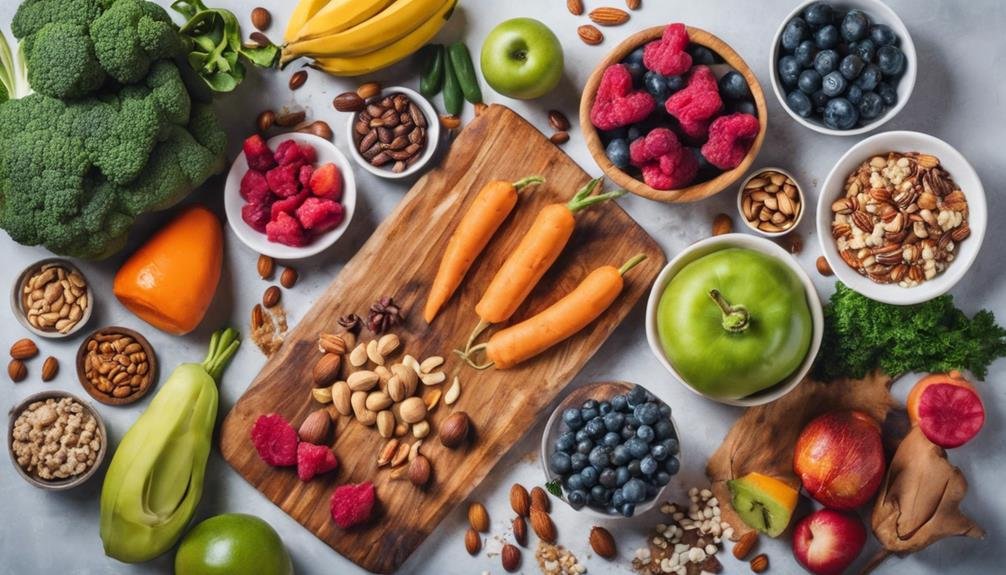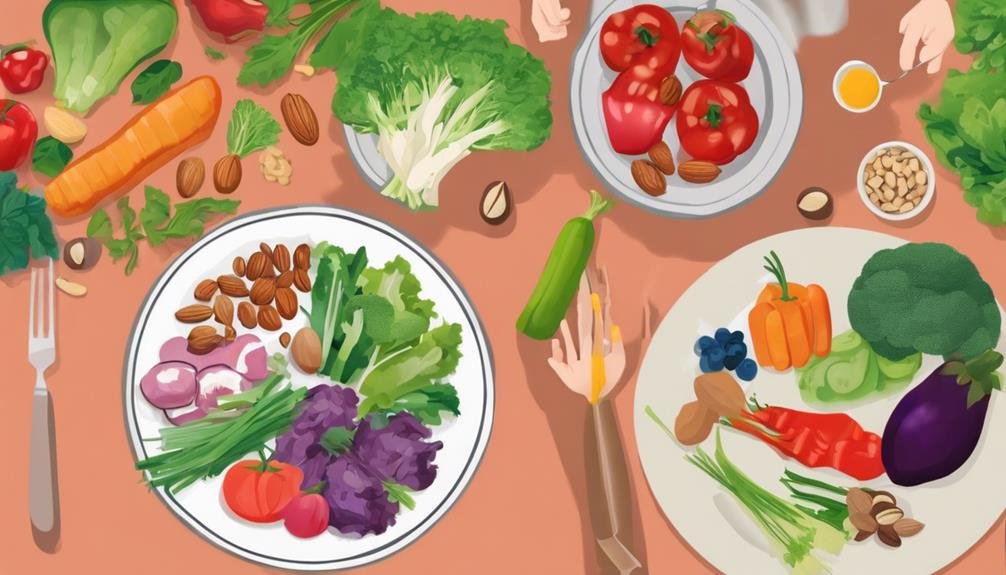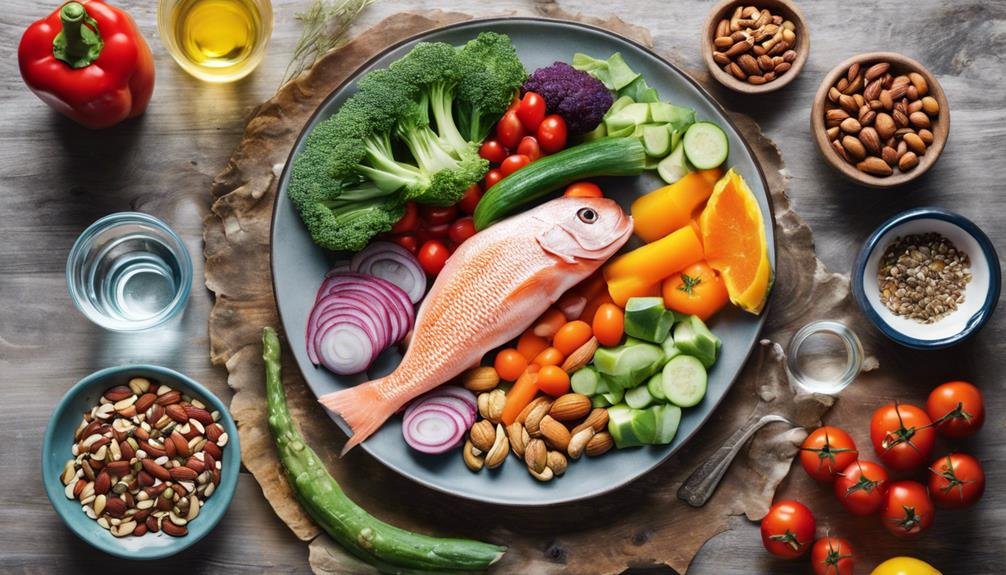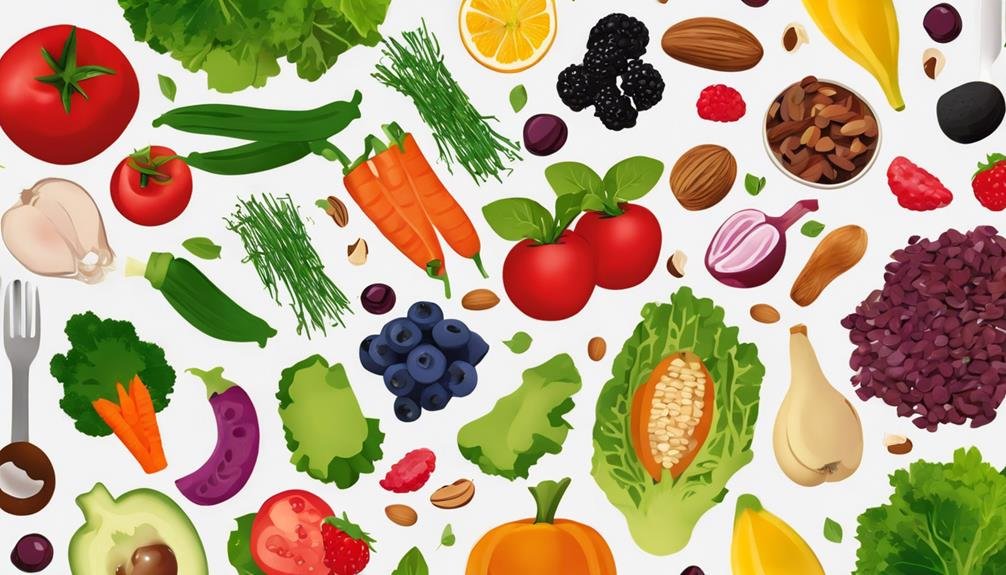Did you know that the Paleo diet, renowned for its emphasis on whole foods and natural ingredients, has been garnering attention for its potential anti-cancer properties? The intriguing connection between the Paleo diet and cancer prevention lies in the intricate interplay of nutrient-rich foods and their ability to combat inflammation, support immune health, and reduce oxidative stress. As you explore the profound impact of this dietary approach on cancer development and progression, you'll uncover a compelling narrative that underscores the significance of food choices in fostering overall well-being and resilience against disease.
Origins of the Paleo Diet
The origins of the Paleo Diet can be traced back to the evolutionary diet patterns of our ancestors during the Paleolithic era. This dietary approach emphasizes consuming whole, unprocessed foods similar to what early humans would have eaten, including lean meats, fish, fruits, vegetables, nuts, and seeds.
The rationale behind the Paleo Diet is rooted in the belief that our bodies are best adapted to the types of foods available during the Paleolithic period, which excludes processed foods, grains, dairy, and legumes. By adhering to this diet, proponents argue that individuals may experience health benefits such as weight loss, improved energy levels, and reduced inflammation.
Research supporting the Paleo Diet's potential anti-cancer properties is still emerging. Some studies suggest that this diet's emphasis on nutrient-dense foods and avoidance of processed products may have protective effects against certain types of cancer. However, more research is needed to fully understand the impact of the Paleo Diet on cancer prevention and treatment.
Nutrient-Dense Foods
Within the realm of dietary approaches, the concept of nutrient density holds paramount importance. When considering the anti-cancer properties of the Paleo diet, focusing on nutrient-dense foods becomes crucial.
Here are three key aspects to consider:
- Vitamins and Minerals: Nutrient-dense foods rich in vitamins and minerals provide essential micronutrients that support various bodily functions. These include antioxidants like vitamin C and selenium, which play a role in reducing oxidative stress and inflammation, potentially lowering cancer risk.
- Phytochemicals: Plant-based foods in the Paleo diet contain phytochemicals such as flavonoids, carotenoids, and polyphenols. These bioactive compounds have been associated with anti-cancer effects, including inhibiting tumor growth and reducing inflammation.
- Healthy Fats: Nutrient-dense sources of healthy fats like omega-3 fatty acids, found in fish and certain nuts and seeds, have been linked to decreased inflammation and improved immune function. These fats may also help regulate cell growth and differentiation, potentially impacting cancer development and progression.
Impact on Inflammation
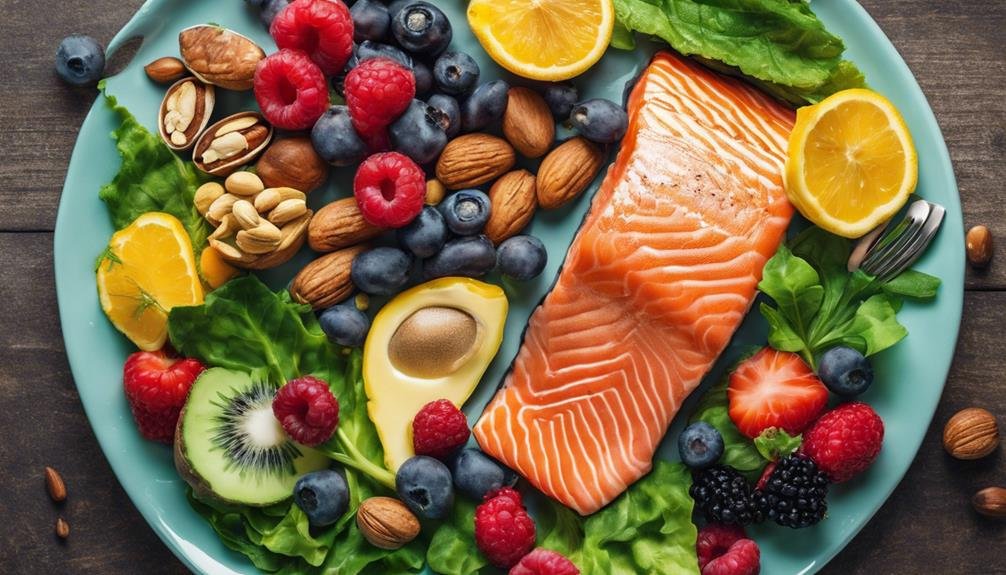
Considering the impact of the Paleo diet on inflammation, emerging research suggests a potential role in modulating the body's inflammatory response. The Paleo diet's emphasis on whole, unprocessed foods rich in nutrients like omega-3 fatty acids, antioxidants, and fiber may contribute to reducing inflammation in the body.
Omega-3 fatty acids, found abundantly in fish and nuts, have been linked to decreased levels of inflammatory markers. Antioxidants from fruits and vegetables can help combat oxidative stress, a common trigger for inflammation. Additionally, the avoidance of processed foods and added sugars, typical in a Paleo diet, may help prevent spikes in blood sugar levels that can contribute to inflammation.
Influence on Insulin Sensitivity
Exploring the impact of the Paleo diet on insulin sensitivity reveals a potential link between dietary choices and metabolic health. Research suggests that adopting a Paleo diet may positively influence insulin sensitivity, which is crucial for managing blood sugar levels and preventing chronic diseases like diabetes.
Here are three key ways the Paleo diet can impact insulin sensitivity:
- Low Glycemic Load: The Paleo diet emphasizes whole foods such as lean proteins, vegetables, fruits, and nuts, which have a lower glycemic load compared to processed foods. This can help stabilize blood sugar levels and improve insulin sensitivity.
- Balanced Macronutrient Profile: By promoting a balance of healthy fats, proteins, and carbohydrates from whole sources, the Paleo diet can support optimal insulin function and metabolic health.
- Reduced Inflammation: The anti-inflammatory properties of the Paleo diet may help reduce systemic inflammation, which can contribute to insulin resistance. By reducing inflammation, insulin sensitivity may improve, lowering the risk of metabolic disorders.
Role in Oxidative Stress
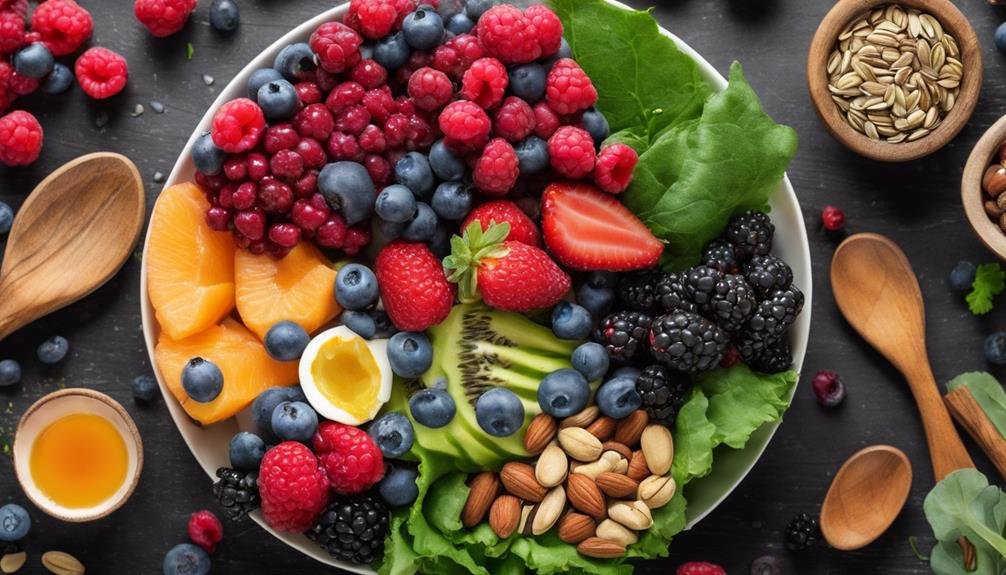
Investigating the Paleo diet's role in oxidative stress sheds light on its potential impact on cellular health and disease prevention.
Oxidative stress occurs when there's an imbalance between the production of free radicals and the body's ability to counteract their harmful effects.
The Paleo diet, rich in antioxidants from fruits, vegetables, nuts, and seeds, may help mitigate oxidative stress by scavenging free radicals and reducing cellular damage.
Research suggests that the diet's emphasis on whole foods and avoidance of processed items may contribute to lower levels of oxidative stress markers in the body.
Effects on Gut Microbiome
The Paleo diet influences the composition and function of the gut microbiome, the complex community of microorganisms residing in the gastrointestinal tract. This diet has been shown to have significant effects on the diversity and abundance of gut bacteria, which can impact various aspects of health, including potential anti-cancer properties.
Here are three key ways the Paleo diet affects the gut microbiome:
- Increased Diversity: Consuming a Paleo diet rich in whole foods such as lean meats, fruits, and vegetables can promote a more diverse gut microbiome. Higher microbial diversity is associated with better overall health and may play a role in reducing cancer risk.
- Reduced Inflammation: The anti-inflammatory nature of the Paleo diet can help create a gut environment that's less conducive to inflammation. Chronic inflammation is linked to the development of various cancers, and by reducing inflammation in the gut, the Paleo diet may offer protective benefits.
- Enhanced Gut Barrier Function: The Paleo diet supports the integrity of the gut barrier, which prevents harmful substances from leaking into the bloodstream. A compromised gut barrier is associated with increased inflammation and a higher risk of cancer development. By promoting gut barrier function, the Paleo diet may help reduce this risk.
Potential Anti-Cancer Mechanisms
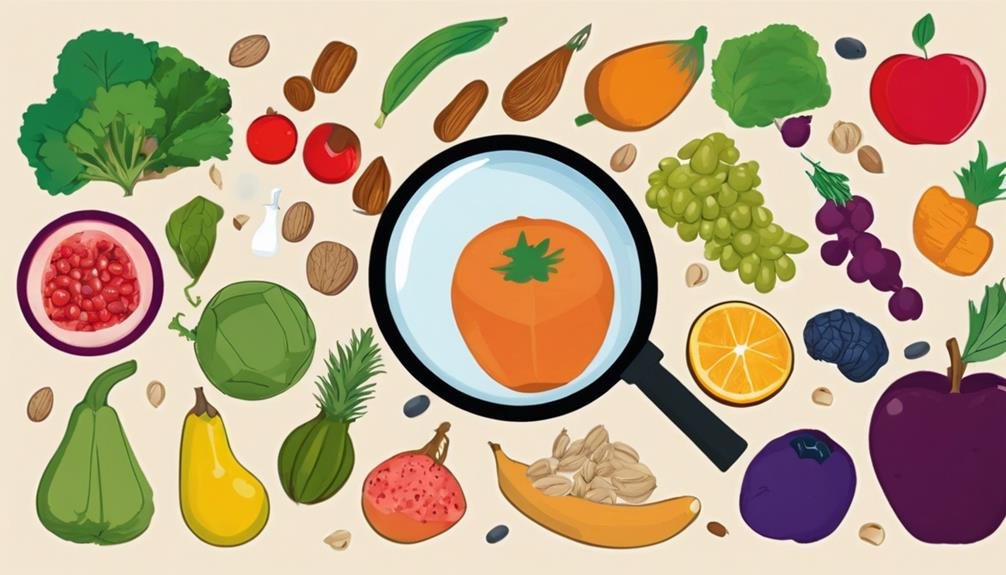
Within the realm of cancer research, understanding the potential anti-cancer mechanisms associated with the Paleo diet is a critical endeavor. The Paleo diet, rich in fruits, vegetables, lean meats, nuts, and seeds, offers several pathways through which it may exert anti-cancer effects. One key mechanism is its ability to reduce chronic inflammation in the body. Chronic inflammation has been linked to the development and progression of various types of cancer, and the anti-inflammatory properties of the Paleo diet may help mitigate this risk factor.
Moreover, the Paleo diet is known to promote a healthy weight and reduce obesity, which is a significant risk factor for many cancers. By maintaining a healthy weight, individuals following the Paleo diet may lower their chances of developing obesity-related cancers.
Additionally, the high intake of antioxidants and phytochemicals from plant-based foods in the Paleo diet can help protect cells from damage and reduce the risk of cancer development. These potential anti-cancer mechanisms make the Paleo diet a promising dietary approach in the prevention and management of cancer.
Studies on Cancer Risk
To comprehend the impact of the Paleo diet on cancer risk, examining empirical studies becomes imperative. Research studies have provided valuable insights into the relationship between the Paleo diet and cancer risk. Here are three key findings from studies investigating this topic:
- Reduced Inflammation: Studies suggest that the anti-inflammatory properties of the Paleo diet may help reduce chronic inflammation, which is a known risk factor for various types of cancer. By promoting a lower inflammatory state in the body, the Paleo diet may potentially lower the risk of developing certain cancers.
- Weight Management: Research indicates that the Paleo diet can be effective in promoting weight loss and maintaining a healthy weight. Since obesity is a significant risk factor for several types of cancer, adopting a Paleo diet that supports weight management may contribute to reducing cancer risk.
- Improved Insulin Sensitivity: Some studies have shown that the Paleo diet can improve insulin sensitivity and blood sugar levels. Enhanced insulin sensitivity is associated with a lower risk of developing insulin-resistant conditions, such as type 2 diabetes, which is a risk factor for certain cancers.
Paleo Diet and Hormonal Balance
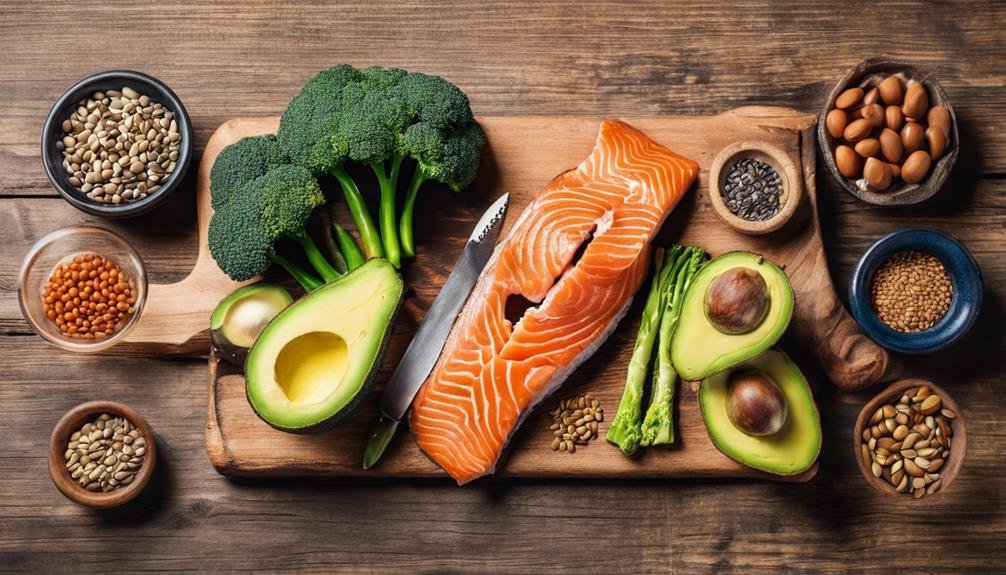
Studies investigating the impact of the Paleo diet on hormonal balance have uncovered compelling insights into how this dietary approach may influence hormone levels and regulation.
The Paleo diet, rich in whole foods such as lean meats, fruits, vegetables, nuts, and seeds, has been shown to support hormonal balance by providing essential nutrients needed for hormone production and regulation. Research suggests that the Paleo diet's emphasis on nutrient-dense foods and avoidance of processed foods may help reduce inflammation, a common factor in hormonal imbalances.
Additionally, the Paleo diet's focus on healthy fats, such as those found in avocados and olive oil, can support hormone synthesis. By promoting a balanced intake of protein, healthy fats, and carbohydrates from whole foods, the Paleo diet may help optimize hormone levels and contribute to overall hormonal health.
Further studies are warranted to fully elucidate the mechanisms through which the Paleo diet influences hormonal balance and its potential implications for disease prevention and management.
Comparisons With Other Diets
The comparison of the Paleo diet with other dietary approaches reveals distinct differences in nutrient composition and potential impact on health outcomes. When considering the anti-cancer properties of different diets, it's essential to understand how each may affect your overall health and well-being.
Here are three key points to consider in comparing the Paleo diet with other common dietary patterns:
- Emphasis on whole foods: The Paleo diet focuses on consuming whole, unprocessed foods such as lean meats, fruits, vegetables, nuts, and seeds. This emphasis on nutrient-dense whole foods may provide a higher intake of essential vitamins and minerals compared to diets high in processed foods.
- Low in processed sugars and additives: Unlike many modern diets, the Paleo diet restricts processed sugars and additives, which are known to contribute to inflammation and may increase the risk of certain cancers.
- Higher in healthy fats: The Paleo diet includes sources of healthy fats such as avocados, olive oil, and nuts, which can provide anti-inflammatory benefits and support overall health.
Practical Tips for Implementation

With an understanding of the distinctive features of the Paleo diet in relation to its potential anti-cancer properties, implementing this dietary approach effectively requires attention to specific guidelines.
To start, focus on consuming whole foods such as lean meats, fish, fruits, vegetables, nuts, and seeds while avoiding processed foods, sugars, and grains. Prioritize organic produce to reduce exposure to pesticides and chemicals, which may have carcinogenic effects.
Incorporating a variety of colorful fruits and vegetables ensures a diverse intake of vitamins, minerals, and antioxidants that can help protect against cancer development. Additionally, aim for a balanced intake of healthy fats from sources like olive oil, avocados, and nuts, which have been associated with reduced cancer risk.
To maintain optimal health and support potential anti-cancer effects, stay hydrated by drinking plenty of water throughout the day. Limit alcohol intake, as excessive consumption has been linked to an increased risk of various cancers.
Engage in regular physical activity to promote overall well-being and further reduce the risk of cancer. By following these practical tips for implementing the Paleo diet, you can enhance its anti-cancer properties and support your journey towards better health.
Future Research Directions
To propel the understanding and application of the Paleo diet's potential in combating cancer, future research avenues should concentrate on elucidating the specific mechanisms through which dietary components interact with cancer pathways. Research should focus on:
- Identification of Key Bioactive Compounds: Investigating and isolating the bioactive compounds present in the Paleo diet that display anti-cancer properties can provide insights into their mechanisms of action.
- Clinical Trials: Conducting well-designed clinical trials to evaluate the efficacy of the Paleo diet in cancer prevention and treatment can offer valuable data for evidence-based recommendations.
- Interaction with Conventional Treatments: Studying how the Paleo diet interacts with conventional cancer treatments such as chemotherapy or immunotherapy is crucial to determine potential synergistic effects or adverse interactions.
Frequently Asked Questions
Can the Paleo Diet Cure Cancer?
Unfortunately, the paleo diet can't cure cancer. It's essential to rely on proven medical treatments recommended by healthcare professionals for cancer management. While a healthy diet can support overall well-being, cancer treatment requires specialized medical interventions like chemotherapy, radiation, or surgery. Always consult with your healthcare team for the most effective treatment options when dealing with cancer.
Is the Paleo Diet Safe for Cancer Patients?
The paleo diet can be safe for cancer patients, as it focuses on whole foods rich in nutrients. However, individual needs vary, so consulting with a healthcare provider is crucial. Some cancer patients may need modifications to meet their specific dietary requirements.
It's important to consider factors like treatment side effects and overall nutritional needs when adopting the paleo diet during cancer treatment. Always seek professional guidance for personalized recommendations.
Does the Paleo Diet Prevent All Types of Cancer?
While the paleo diet has shown promise in some studies, claiming it prevents all types of cancer would be an exaggeration. Research suggests that the paleo diet's emphasis on whole foods, lean proteins, and healthy fats may reduce inflammation and support overall health, potentially lowering cancer risk. However, individual factors and genetics play significant roles in cancer development. It's essential to consult healthcare professionals for personalized cancer prevention strategies.
How Does the Paleo Diet Affect Chemotherapy Effectiveness?
When following the Paleo diet, chemotherapy effectiveness may vary. Research suggests that a diet rich in whole foods, lean proteins, and healthy fats can support overall health and potentially enhance the body's response to treatment. However, individual responses can differ, and it's essential to consult with healthcare providers to ensure that dietary choices align with your treatment plan. Maintaining a balanced, nutrient-dense diet can be a supportive measure during chemotherapy.
Are There Any Specific Paleo Recipes for Cancer Prevention?
Looking to beef up your anti-cancer arsenal with specific paleo recipes? While research on this topic is ongoing, incorporating nutrient-dense foods like leafy greens, berries, and lean proteins in your paleo meals may provide potential benefits.
Experiment with colorful vegetable stir-fries, grilled salmon with avocado salsa, or roasted vegetable salads to support your overall health and possibly contribute to cancer prevention.
Conclusion
You have delved into the world of the Paleo diet and its potential anti-cancer properties. By focusing on nutrient-dense foods and reducing inflammation, this diet may play a crucial role in cancer prevention and management. While further research is needed to fully understand its impact, the Paleo diet offers a promising avenue for those seeking a holistic approach to health and well-being. Keep exploring, stay informed, and make informed choices for your health.
